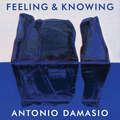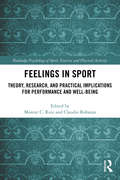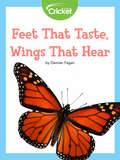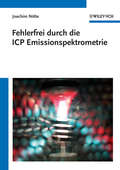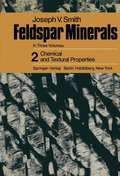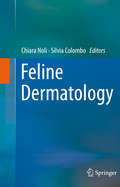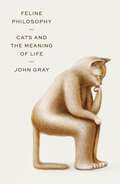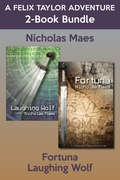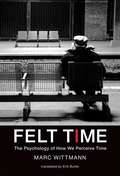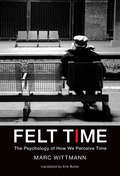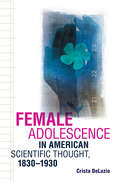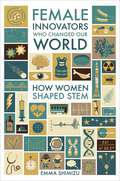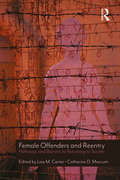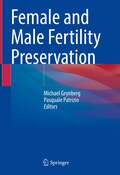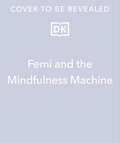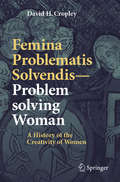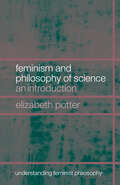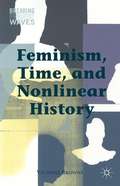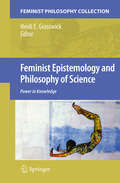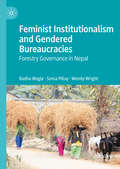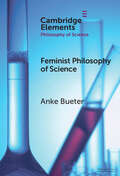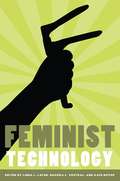- Table View
- List View
Feeling and Knowing: Making Minds Conscious
by Antonio DamasioIn recent decades, many philosophers and cognitive scientists have declared the question of consciousness unsolvable, but Antonio Damasio is convinced that recent findings in neuroscience, psychology and artifical intelligence have given us the necessary tools to solve its mystery. In Feeling & Knowing, Damasio elucidates the myriad aspects of consciousness and presents his analysis and new insights in a way that is faithful to our own intuitive sense of the experience.In forty-eight brief chapters, Damasio helps us understand the relation between consciousness and the mind; why being conscious is not the same as either being awake or sensing; the central role of feeling; and why the brain is essential for the development of consciousness. He synthesises the recent findings of various sciences with the philosophy of consciousness, and, most significantly, presents his original research which has transformed our understanding of the brain and human behaviour.Here is an indispensable guide to understanding the fundamental human capacity for informing and transforming our experience of the world around us and our perception of our place in it.
Feelings in Sport: Theory, Research, and Practical Implications for Performance and Well-being (Routledge Psychology of Sport, Exercise and Physical Activity)
by Montse C. Ruiz Claudio RobazzaFeeling states, including emotional experiences, are pervasive to human functioning. Feeling states deeply influence the individual’s effort, attention, decision making, memory, behavioural responses, and interpersonal interactions. The sporting environment offers an ideal setting for the development of research questions and applied interventions to improve the well-being and well-functioning of the people involved. This ground-breaking book is the first to offer cutting-edge knowledge about contemporary theoretical, methodological, and applied issues with the contributions of leading researchers and practitioners in the field. Feeling states in sports are comprehensively covered by adopting an international and multi-disciplinary perspective. Part I covers most relevant conceptual frameworks, including emotion-centred and action-centred approaches, challenge and threat evaluations, an evolutionary approach to emotions, and the role of passion in the experience of emotion. Part II focuses on interpersonal aspects related to emotions and regulation, encompassing social and interpersonal emotion influence and regulation, social identity and group-based emotions, and performance experiences in teams. Part III presents applied indications surrounding emotional intelligence training, and emotional regulation strategies including imagery, self-talk, the use of music, mindfulness, motor skills execution under pressure, self-regulation in endurance sports, and the use of technology. Finally, Part IV examines issues related to athlete well-being, including the role of emotions in sport injury, emotional eating, and mental recovery. Feelings in Sport: Theory, Research, and Practical Implications for Performance and Well-being is an essential source for sport psychology practitioners, researchers, sports coaches, undergraduate and postgraduate students.
Feelings in Sport: Theory, Research, and Practical Implications for Performance and Well-being (Routledge Psychology of Sport, Exercise and Physical Activity)
by Claudio Robazza Montse RuizFeeling states, including emotional experiences, are pervasive to human functioning. Feeling states deeply influence the individual’s effort, attention, decision making, memory, behavioural responses, and interpersonal interactions. The sporting environment offers an ideal setting for the development of research questions and applied interventions to improve the well-being and well-functioning of the people involved. This ground-breaking book is the first to offer cutting-edge knowledge about contemporary theoretical, methodological, and applied issues with the contributions of leading researchers and practitioners in the field. Feeling states in sports are comprehensively covered by adopting an international and multi-disciplinary perspective. Part I covers most relevant conceptual frameworks, including emotion-centred and action-centred approaches, challenge and threat evaluations, an evolutionary approach to emotions, and the role of passion in the experience of emotion. Part II focuses on interpersonal aspects related to emotions and regulation, encompassing social and interpersonal emotion influence and regulation, social identity and group-based emotions, and performance experiences in teams. Part III presents applied indications surrounding emotional intelligence training, and emotional regulation strategies including imagery, self-talk, the use of music, mindfulness, motor skills execution under pressure, self-regulation in endurance sports, and the use of technology. Finally, Part IV examines issues related to athlete well-being, including the role of emotions in sport injury, emotional eating, and mental recovery. Feelings in Sport: Theory, Research, and Practical Implications for Performance and Well-being is an essential source for sport psychology practitioners, researchers, sports coaches, undergraduate and postgraduate students.
Feet That Taste, Wings That Hear
by Damian FaganLike other wildlife, butterflies use different senses to find food and mates and to watch out for predators. But how they see, smell, taste, touch, and hear is very different from other animals.
Feet!
by Peter ParnallLooks at a variety of animal feet, from big feet and fast feet to cool feet and webbed feet.
Fehler vor, während und nach der Wärmebehandlung von Stahl
by Peter SommerEine Vielzahl an Stahlbauteilen wird zur Eigenschaftsveränderung einer Wärmebehandlung unterzogen. Dieses praxisbezogene Buch gibt einen anschaulichen Überblick über die unterschiedlichen Einflussbereiche im Lebenszyklus solcher Produkte - von der Konstruktion bis zum Einsatz. Anhand zahlreicher Beispiele wird aufgezeigt, welche Fehlerquellen im Zusammenhang mit einer Wärmebehandlung auftreten können und wie diese vermieden werden. Dabei schöpft der Autor aus seiner jahrzehntelangen Erfahrung im Bereich der technischen Schadensanalyse und bietet Studierenden wie Praktiker*innen eine wertvolle Hilfestellung.
Fehlerfrei durch die ICP Emissionsspektrometrie
by Joachim NölteDas bewährte Konzept der Fallstricke - jetzt auch für ICP! Eingängige, hervorragend durchdachte Kombinationen von Bildmaterial und knappen, aber aussagekräftigen Texten vermitteln die gewünschte Lösung ohne Umwege.
Feldspar Minerals: 2 Chemical and Textural Properties
by J.V. Smith33 14. 3. 5 REE between Plagioclase and Aqueous Fluid 0 Cullers et al. (1973) measured the distribution of REE at 850 C and 750 bars pressure between a natural plagioclase, An , and gaseous water. The rare earths 65 favored the plagioclase by a factor which varies from about 25 for Ce to 10 for Lu. Data were also obtained for forsterite, diopside, enstatite and two rhyolite glasses, on the one hand, and water on the other hand, thereby permitting estimation of the partition coefficients between all pairs of phases. 14. 4 Chemical Substitution in Natural Feldspars 14. 4. 1 Introduction It is quite impracticable to give all the data on chemical substitution in natural feldspars: indeed many of the details are significant only to some particular pegmatite or rock body. As far as possible, emphasis is placed on features of general interest to crystal chemists and to petrologists. Ironically the well established features can be described more easily than the uncertain ones, and unfortunately it is necessary to use valuable space on data of dubious value. The bibliography is fairly complete, but it was impracticable to locate all data, especially those in obscure journals. Each reference is followed by a list of the elements referred to in the paper, thereby permitting a reader to compile a fairly compre hensive set of references on any chosen element. Not all papers are mentioned in the text. The book on Geochemistry and Mineralogy of Rare Elements, etc.
Feline Dermatology
by Chiara Noli Silvia ColomboThis richly-illustrated handbook covers all aspects of modern feline dermatology, from the approach to different signs and symptoms to the description of the etiology, pathogenesis, clinical manifestation, diagnosis and current treatment of each feline dermatological disease. Thus this manual serves as essential practical guide to the busy practitioner to quickly and surely tackle cats with dermatological conditions, and offers a current and complete reference tool for the feline veterinarian and the veterinary dermatologist.
Feline Philosophy: Cats and the Meaning of Life
by John GrayThe author of Straw Dogs, famous for his provocative critiques of scientific hubris and the delusions of progress and humanism, turns his attention to cats—and what they reveal about humans' torturous relationship to the world and to themselves. The history of philosophy has been a predictably tragic or comical succession of palliatives for human disquiet. Thinkers from Spinoza to Berdyaev have pursued the perennial questions of how to be happy, how to be good, how to be loved, and how to live in a world of change and loss. But perhaps we can learn more from cats--the animal that has most captured our imagination--than from the great thinkers of the world. In Feline Philosophy, the philosopher John Gray discovers in cats a way of living that is unburdened by anxiety and self-consciousness, showing how they embody answers to the big questions of love and attachment, mortality, morality, and the Self: Montaigne's house cat, whose un-examined life may have been the one worth living; Meo, the Vietnam War survivor with an unshakable capacity for "fearless joy"; and Colette's Saha, the feline heroine of her subversive short story "The Cat", a parable about the pitfalls of human jealousy. Exploring the nature of cats, and what we can learn from it, Gray offers a profound, thought-provoking meditation on the follies of human exceptionalism and our fundamentally vulnerable and lonely condition. He charts a path toward a life without illusions and delusions, revealing how we can endure both crisis and transformation, and adapt to a changed scene, as cats have always done.
Felix Taylor Adventures 2-Book Bundle: Laughing Wolf / Fortuna
by Nicholas MaesFor the first time, the Felix Taylor Adventures are available as together in this two-book bundle. Short-listed for the Snow Willow Young Reader’s Choice Award and the Manitoba Young Reader’s Choice Award. "An entertaining and thoughtful read that will please fans of sci-fi and historical fiction alike." - Caitlin Campbell, CM magazine Fortuna - Felix Taylor Adventure #2 (NEW!) Just when Felix thought the 23rd century was returning to normal, Felix and Caroline must follow a stranger back in time and stop them before Felix’s world turns to dust. Laughing Wold - Felix Taylor Adventure #1 When a mysterious plague places humanity on the brink of eradication, Felix must project back in time and retrieve the only possible cure, a flower common in ancient Rome, but extinct for more than 2,000 years.
Felt Time: The Psychology of How We Perceive Time
by Marc Wittmann Erik ButlerWe have widely varying perceptions of time. Children have trouble waiting for anything. ("Are we there yet?") Boredom is often connected to our sense of time passing (or not passing). As people grow older, time seems to speed up, the years flitting by without a pause. How does our sense of time come about? In Felt Time, Marc Wittmann explores the riddle of subjective time, explaining our perception of time -- whether moment by moment, or in terms of life as a whole. Drawing on the latest insights from psychology and neuroscience, Wittmann offers a new answer to the question of how we experience time.Wittmann explains, among other things, how we choose between savoring the moment and deferring gratification; why impulsive people are bored easily, and why their boredom is often a matter of time; whether each person possesses a personal speed, a particular brain rhythm distinguishing quick people from slow people; and why the feeling of duration can serve as an "error signal," letting us know when it is taking too long for dinner to be ready or for the bus to come. He considers the practice of mindfulness, and whether it can reduce the speed of life and help us gain more time, and he describes how, as we grow older, subjective time accelerates as routine increases; a fulfilled and varied life is a long life. Evidence shows that bodily processes -- especially the heartbeat -- underlie our feeling of time and act as an internal clock for our sense of time. And Wittmann points to recent research that connects time to consciousness; ongoing studies of time consciousness, he tells us, will help us to understand the conscious self.
Felt Time: The Psychology of How We Perceive Time
by Marc WittmannAn expert explores the riddle of subjective time, from why time speeds up as we grow older to the connection between time and consciousness. We have widely varying perceptions of time. Children have trouble waiting for anything. (“Are we there yet?”) Boredom is often connected to our sense of time passing (or not passing). As people grow older, time seems to speed up, the years flitting by without a pause. How does our sense of time come about? In Felt Time, Marc Wittmann explores the riddle of subjective time, explaining our perception of time—whether moment by moment, or in terms of life as a whole. Drawing on the latest insights from psychology and neuroscience, Wittmann offers a new answer to the question of how we experience time.Wittmann explains, among other things, how we choose between savoring the moment and deferring gratification; why impulsive people are bored easily, and why their boredom is often a matter of time; whether each person possesses a personal speed, a particular brain rhythm distinguishing quick people from slow people; and why the feeling of duration can serve as an “error signal,” letting us know when it is taking too long for dinner to be ready or for the bus to come. He considers the practice of mindfulness, and whether it can reduce the speed of life and help us gain more time, and he describes how, as we grow older, subjective time accelerates as routine increases; a fulfilled and varied life is a long life. Evidence shows that bodily processes—especially the heartbeat—underlie our feeling of time and act as an internal clock for our sense of time. And Wittmann points to recent research that connects time to consciousness; ongoing studies of time consciousness, he tells us, will help us to understand the conscious self.
Female Adolescence in American Scientific Thought, 1830–1930 (New Studies in American Intellectual and Cultural History)
by Crista DeLuzioIn this groundbreaking study, Crista DeLuzio asks how scientific experts conceptualized female adolescence in the nineteenth and early twentieth centuries. Revisiting figures like G. Stanley Hall and Margaret Mead and casting her net across the disciplines of biology, psychology, and anthropology, DeLuzio examines the process by which youthful femininity in America became a contested cultural category.Challenging accepted views that professionals "invented" adolescence during this period to understand the typical experiences of white middle-class boys, DeLuzio shows how early attempts to reconcile that conceptual category with "femininity" not only shaped the social science of young women but also forced child development experts and others to reconsider the idea of adolescence itself. DeLuzio’s provocative work permits a fuller understanding of how adolescence emerged as a "crisis" in female development and offers insight into why female adolescence remains a social and cultural preoccupation even today.
Female Innovators Who Changed Our World: How Women Shaped STEM (Trailblazing Women Ser.)
by Emma GreenWe are not all born with equal opportunities. Yet there have been countless of women who have overcome a range of barriers such as prejudice, illness, and personal tragedy to advance our understanding of science, technology, engineering, and mathematics (STEM). They used their knowledge to change the world, and their stories are fascinating. This book offers a concise introduction of the lives of 46 women, taking you into the cultural and social context of the world they lived in. Through their intelligence, courage, and resilience, they used STEM to defy expectations and inspire generations to follow in their footsteps. Some of them invented items we use day-to-day and discovered causes and treatments for epidemics that ostracised whole sections of society, whilst others campaigned for the reproductive rights of women and harnessed mathematics to send people into space and break ciphers. These women are proof that females can and did have a hugely significant role in shaping the world we live in today.
Female Offenders and Reentry: Pathways and Barriers to Returning to Society
by Catherine D. Marcum Lisa M. CarterOften, research concerning the female offender is scarce. This book adds to the criminological literature on the topic of reentry for women, focusing on the barriers women face as they return to society and adjust to life after incarceration. Each chapter addresses specific issues, challenges, and obstacles affiliated with the hindrance of successful reentry processes associated with female offenders, as well as data-driven empirical studies. While corrections has often misunderstood or overlooked the needs of returning offenders, the shortcomings of the institutions have a greater impact on women than on their male counterparts, particularly regarding the occurrence of social and medical problems, especially those related to mental health and substance abuse. Female Offenders and Reentry helps criminal justice students and practitioners see the full picture when considering the challenges faced by female offenders reintegrating into society.
Female and Male Fertility Preservation
by Pasquale Patrizio Michael GrynbergThis book comprehensively addresses female and male fertility preservation. It discusses in detail all major aspects of fertility preservation in both sexes, explains the basis of fertility preservation, and highlights the currently available techniques; further chapters are dedicated to specific diseases. The book offers an essential reference guide for all physicians, specialists or not, seeking to improve their grasp of female and male fertility preservation.
Femi and The Mindfulness Machine (Woke Babies Books)
by Flo FieldingCome along on this wonderful STEM story that follows Femi as he battles with anxiety and overcomes his fears before Science Day.Meet Femi, a hardworking little boy whose nerves can sometimes get the better of him. One evening, Femi is showing his Grandma the wind machine he has built, but when it doesn&’t work his tummy flutters and his legs start to wobble. What if his project doesn&’t work on the day? What if his teacher doesn&’t like it?Children commonly experience anxiousness. Made in collaboration with Woke Babies, this book aims to normalize this feeling of worry and provide children with a technique to combat it. With vivid illustrations accompanying the inspiring story, this picture book is ideal for children aged 3-5 and will subtly teach them about science and mindfulness.This encouraging STEM book for children offers:- Material that&’s made in collaboration with both educational and STEM consultants to ensure that it&’s accurate.- A beautifully illustrated story that gently teaches mindfulness and STEM to its young readers.- Content made by people of color and a black protagonist in the book, as it is important for children to relate to characters in books.Whether you are looking for a heart-warming story with inspiring characters, or a gift for a little one, Femi and the Mindfulness Machine will make the perfect addition to any child&’s bookshelf. What are you waiting for? Let&’s go to Science Day!
Femina Problematis Solvendis—Problem solving Woman: A History of the Creativity of Women
by David H. CropleyThis book explores the history of modern human creativity/innovation, highlighting examples of solutions to basic human’ needs that have been developed over time. The title – Femina Problematis Solvendis – is a play on the scientific classifications of humans (Homo habilis, Homo erectus, Homo sapiens), but with special focus on inventions pioneered by women (“femina”) and is intended to suggest that a defining characteristic of modern humans is our fundamental ability to solve problems (i.e., problem-solving woman = Femina problematis solvendis), Written by David H. Cropley, an internationally recognised expert on creativity and innovation, it also builds on his previous book “Homo Problematis Solvendis –Problem-solving Man”, published in 2019. The book explores innovations over ten distinct “ages” of human history, beginning with “prehistory”, and moving up to the present “information age”. Each era is covered by a dedicated chapter that describes three key innovations that were either definitely invented by a woman or can be plausibly attributed to a female inventor. The book’s focus on female inventors also serves to highlight some of the ways women have been treated in societies over time.
Feminism and Philosophy of Science: An Introduction (Understanding Feminist Philosophy)
by Elizabeth PotterReflecting upon the recent growth of interest in feminist ideas of philosophy of science, this book traces the development of the subject within the confines of feminist philosophy. It is designed to introduce the newcomer to the main ideas that form the subject area with a view to equipping students with all the major arguments and standpoints required to understand this burgeoning area of study. Arranged thematically, the book looks at the spectrum of views that have arisen in the debate. It is broadly arranged into sections dealing with concepts such as the notion of value free-science, values, objectivity, point of view and relativism, but also details the many subsidiary ideas that have sprung from these topics.
Feminism, Time, and Nonlinear History
by Victoria BrowneInterweaving phenomenological, hermeneutical, and sociopolitical analyses, this book considers the ways in which feminists conceptualize and produce the temporalities of feminism, including the time of the trace, narrative time, calendar time, and generational time.
Feminist Epistemology and Philosophy of Science
by Heidi E. GrasswickHaving enjoyed more than twenty years of development, feminist epistemology and philosophy of science are now thriving fields of inquiry, offering current scholars a rich tradition from which to draw. In addition to a recognition of the power of knowledge itself and its effects on women's lives, a central feature of feminist epistemology and philosophy of science has been the attention they draw to the role of power dynamics within knowledge-seeking practices and the implications of these dynamics for our understandings of knowledge, science, and epistemology. Feminist Epistemology and Philosophy of Science: Power in Knowledge collects new works that address today's key challenges for a power-sensitive feminist approach to questions of knowledge and scientific practice. The essays build upon established work in feminist epistemology and philosophy of science, offering new developments in the fields, and representing the broad array of the feminist work now being done and the many ways in which feminists incorporate power dynamics into their analyses.
Feminist Institutionalism and Gendered Bureaucracies: Forestry Governance in Nepal
by Soma Pillay Wendy Wright Radha WagleThis book examines the processes for the inclusion of women, and the role of women employees in Nepal’s forestry bureaucracy. The book adopts a “gender lens” drawn from feminist institutionalism and is framed around the following four objectives: evaluating the effectiveness of current legislative and policy frameworks for the inclusion of women in the Nepalese forest bureaucracy; examining the dynamics of organizational culture, formal and informal institutions, and structure and agency in and around forest bureaucracy in Nepal; assessing power relations in forestry institutions focusing on influential participation of women forestry professionals in the bureaucratic structure; and gaining insights about the alternative space of feminist institutionalism in connection with women inclusive forest bureaucracy.Findings in the book inform and extend feminist institutionalism perspectives by applying it to a context which remains under explored, providing insights on the efficacy of public sector cultural change, especially as it relates to those areas within bureaucracies less in a position to adopt the changes mandated by society and principles of good governance.
Feminist Philosophy of Science (Elements in the Philosophy of Science)
by Anke BueterFeminist scholars have identified pervasive gender discrimination in science as an institution, as well as gender bias in the very content of many scientific theories. An ameliorative project at heart, feminist philosophy of science has inquired into the social and epistemological roots and consequences of these problems and into their potential solutions. Most feminist philosophers agree on a need for diversity in scientific communities to counter the detrimental effects of gender bias. Diversity could thus serve as a unifying concept for a potential consensus of the field. Yet there are substantial differences in the kinds and roles of diversity envisaged. This element argues that we need diversity, both in terms of social locations and of values, to overcome former biases and blind spots. Diversity as such, however, is insufficient. To reap its epistemic benefits, diversity also needs to be institutionalised in a way that counters various forms of epistemic injustice.
Feminist Technology (Women, Gender, and Technology)
by Linda L. Layne Sharra Vostral Kate BoyerIs there such a thing as a "feminist technology"? If so, what makes a technology feminist? Is it in the design process, in the thing itself, in the way it is marketed, or in the way it is used by women (or by men)? In this collection, feminist scholars trained in diverse fields consider these questions by examining a range of products, tools, and technologies that were specifically designed for and marketed to women. Evaluating the claims that such products are liberating for women, the contributors focus on case studies of menstrual-suppressing birth control pills, home pregnancy tests, tampons, breast pumps, Norplant, anti-fertility vaccines, and microbicides. In examining these various products, this volume explores ways of actively intervening to develop better tools for designing, promoting, and evaluating feminist technologies. Recognizing the different needs and desires of women and acknowledging the multiplicity of feminist approaches, Feminist Technology offers a sustained debate on existing and emergent technologies that share the goal of improving women's lives. Contributors are Jennifer Aengst, Maia Boswell-Penc, Kate Boyer, Frances Bronet, Shirley Gorenstein, Anita Hardon, Deborah G. Johnson, Linda L. Layne, Deana McDonagh, and Sharra L. Vostral.
